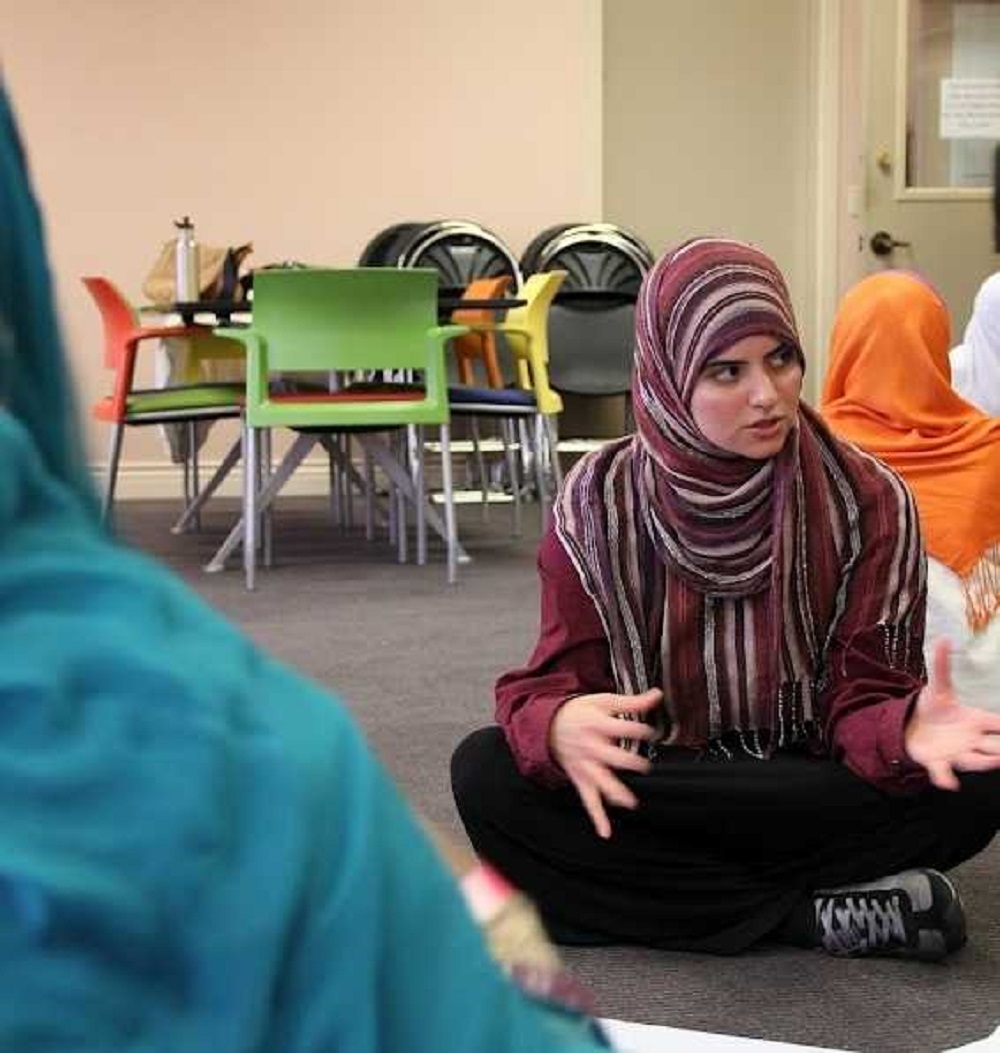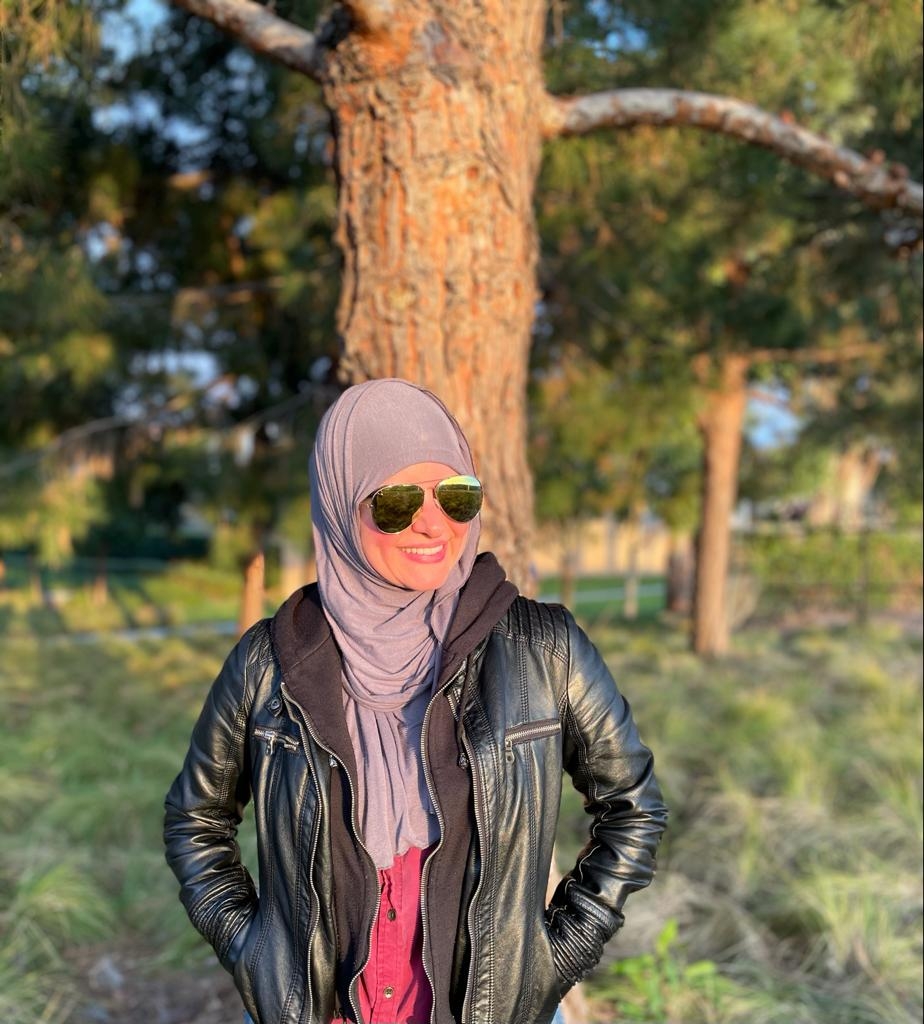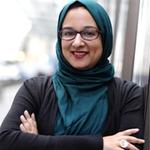Ustadha Maryam Amir's Qariah App is Giving Space & Validation to Women Quran Reciters
Community
|
Apr 9, 2022
|
9 MIN READ

Image source: Muslim Matters
Ustadha Maryam Amir is a lot of things to a lot of people – an educator, a scholar, a woman who inspires (she was one of the first teachers of Islam I told my daughter to follow on Instagram!), a teacher of our deen, a mentor, a nurturer, a hafidha (one who has memorized the Quran), a Qariah (a skilled reciter of the Quran) and so much more.
It is this last descriptor – Qariah – that has led her to her latest work, which is igniting so much excitement among Muslim women around the world. Ustadha Maryam is the creator of “Qariah: The Women Quran Reciters App,” which launched this Ramadan and brings Quran recitations from women all over the world to your phone.
According to the Qariah website, the app features 60 women on a global landscape, from Tanzania to Morocco to Spain to Somalia to Pakistan to Malaysia to Yemen to the United States and so many more countries and cultures. The app, according to an FAQ on its website, is “intended for women and girls to learn the Quran from women’s recitations. This app is women’s recitations, for women, by women, for the sake of Allah.”
I caught up with Ustadha Maryam for this detailed interview in which we got into the details of the Qariah app, why it was important to her to develop it, and her hopes for how the app can help Muslim women, especially those who are juggling so many things (which pretty much means all of us ) develop a stronger, more intimate relationship with the Quran.
Ustadha Maryam dropped SO MANY GEMS and stories that we’re bringing this interview to you in two parts. Click here for part two of this interview!
This app has personal meaning to you. You are on a mission – please share the story.

Image source: Instagram
Growing up, I wasn’t sure if I wanted to be Muslim. Born and raised in California, the first time I traveled outside of the United States was for my family’s religious pilgrimage to Makkah, which transformed me. And, I came back seeking to know more about God. Most of my relatives converted to Islam, yet I had never read the translation of the Quran. The more I did, the more I wanted to immerse myself in it, to become a scholar of it, to memorize it. One space I had never actually considered myself in with regards to the Quran was becoming an official reciter of it.
In fact, I didn’t even know women could be Quran reciters. When my local mosque organized an interfaith event and opened the event with a teenage girl reciting the Quran, I was shocked – and I recoiled. I had assumed the reason I never saw a woman in this capacity was because it was religiously forbidden for women to be in such a role.
In my naiveté, I went to the organizer of the event in the mosque and explained why it was inappropriate that she had invited a girl to recite the Quran in a public capacity.
The organizer was a woman who had immigrated to the United States from Indonesia. She replied warmly, “In Indonesia, women recite the Quran on television, in conferences, in competitions; it is the norm for women to be Quran reciters.”
That was the first moment I encountered the idea that women could potentially be Quran reciters. A few years later, I moved to Egypt to learn Arabic and formally begin Islamic scholarship studies. As I walked in Masjid Al-Azhar, one of the most prestigious religious centers in the world, I saw a famed male Quran reciter sitting on a chair with over 200 students sitting on the floor in front of him. The students were both men and women, and they eagerly listened as he recited verses, and they repeated those verses back to him, mimicking his style. I watched, enraptured. I had never seen men and women learning the Quran in the same setting in my local mosque, and I was amazed at how this was, simply … normal.
When I came back to the United States and was working on my Master’s at UCLA, I studied under an incredible scholar of Quran, Shaykh Moheb Fouda. As I worked on completing my memorization of the Quran with him, he asked me to recite the Quran as the opening reciter at the end of the year banquet.
I stared at him, surprised. “But … I’m a woman!” I exclaimed. He got so angry. He replied, “Maryam! Don’t you know that women have been Quran reciters throughout Islamic history? Don’t you know that some of the most famed men Quran reciters were taught by women? This is our history! This is Islamic legacy! Women as Quran reciters!”

Image source: Quranreflect.com
And so, I recited at the banquet. And then I began to speak with men and women scholars of Islam internationally about this issue, and I learned that in many countries such as Indonesia, Malaysia, Singapore, Morocco, Algeria, Nigeria, Tanzania and elsewhere, there were women who are professional Quran reciters, who host television shows reciting Quran, who recite and judge recitations in major international Quran competitions where men and women fly from all over the world to compete against one another to see whose recitation is best, where women recite the Quran to open conferences, weddings and major events.
And the more I researched and traveled and learned, I began to realize that there were many, many women who, like me, had no idea that women could be Quran reciters, had never recited the Quran with clear, strong, melodious voices instead of lovingly reverent whispers, had never had a teacher tell them that they would be appointed as the designated reciter and that the physical space and equipment such as a microphone and sound system, would be provided just for them to share their recitation.
I began reciting the Quran at religious events geared towards building spiritual sisterhood amongst women. This included touring through the U.K. and reciting the Quran. There were hundreds of women who attended each event of the tour. Women of all ages came to me afterwards – weeping, tearful, emotional – saying it was the very first time they had heard a woman reciting the Quran.
After one event, an elder woman asked me if she could sit with me, and she shared, “I drove four hours to come here tonight. You spoke in my city a few days ago, and a friend of mine attended. I wasn’t really interested, and I didn’t go. She called me and said, ‘You missed out on something I’ve never heard before in my life.’ So I drove today so that I could hear you. And it is the first time in my life – I’m in my fifties – that I have ever heard a woman reciting the Quran. And after hearing you, I just want to know- how can I memorize the Quran, too? How can I recite the Quran like this, too?”
A woman in her late teens told me she was a professional singer in her school’s choir and asked how she could start learning the melodious recitation of the Quran and use her voice for recitation. A mother in her thirties with young children told me that after hearing me, she started reciting Quran for her children; now her children were reciting the Quran along with her.

Surah Kahf on the Qariah app; image source: Instagram
The more I heard stories like this from women, the more I realized that my initial understanding of women not being Quran reciters was not specific to me or even to just a few people. In fact, it seemed that the majority of Muslim women living in the United States, Canada, England and other countries in Europe, the U.K. with whom I personally interacted with had thought the same. And it wasn’t simply that they heard me and said, “That’s really cool.” They would hear me, [be] shocked, come in tears and say they had never heard something so healing in their life, and they wanted it too.
So these stories were the motivation to create the app?
The reaction was so consistent that I realized that more women needed to have access to women’s recitations. It was clearly quite literally moving for so many women, who had discovered for the first time that women are also Quran reciters. And the only way to help other women access that initial spark of connection en masse was through social media. Thus in the holy month of fasting, Ramadan of 2020, after speaking with a number of scholars on how best to help create women’s access to the idea of women being memorizers and reciters of the Quran, I started the #FOREMOTHERS campaign on Instagram under [my account], @themaryamamir.
The objective of the campaign was to provide women with examples of other women who had memorized the Quran, who had ijazas, or religious licenses to teach the Quran, and who were powerful, gentle, incredible reciters of the Quran – just as the women companions (our foremothers) who surrounded the Prophet Muhammad (saw) had been.
This campaign took off. Thousands of viewers watched stories daily where I would put up a sample of my recitation, asking other women to share theirs as well. And, they did! Some were beginners, some didn’t know how to read in Arabic at all and they joined by reading the English translation aloud, some shared they had memorized the Quran years ago but had felt so discouraged by being told they could never be professional Quran reciters that they hadn’t recited out loud – even in the privacy of their own room – in many years. This campaign suddenly opened these doors of women being connected to other women reciting the Quran all across the world!
And I started interviewing women who are professional Quran reciters in countries where women recite professionally. Every month, sometimes multiple times, I’d interview a Quran reciter – a Qariah – who shared how she had completed her Quranic memorization, how she had won international competitions, how in her country, women learned how to change the pitch of their voices to recite with perfect voice control as a part of their regular school curriculum alongside their male counterparts with whom they would continue to compete against and become teachers with in the future.

Image source: Muslim Matters
I [also] invited regular women to join me on my Instagram live and do four-way recitations with me and sometimes another Qariah. Sometimes we could have four women from literally four corners of the globe, and I wouldn’t even be able to communicate with them in their native language other than the common words we all recognized to denote what we’d read of a chapter in the Quran!
The more I interviewed women, the more I began receiving messages from women. I averaged around 300 personal messages a week on a slow week! One woman shared that she was 40 years old, and she recited out loud for the first time in her entire life in front of her parents and her mother wept, her parents stating this was the best gift they could have given them. Many mothers sent me recitations with their daughters, telling me they’ve been memorizing the Quran with my recitations and that their young children eagerly wait for the live sessions, actually saying that they can’t wait to become Qariahs too.
Some women shared their recordings with their mothers and grandmothers all taking turns in the recitation. The impact was immediately generational and the more I saw it, the more I realized we needed a more tangible space.
And most importantly, the Quran is a book which calls for a direct connection to God and a command for personal accountability and societal justice. Women told me they were changing; they were healing, they wanted to help others heal, and for the first time in over a decade, they were praying again and connecting to others and society in more meaningful ways. The Quran is about action, and the impact on these women’s lives left no doubt that this needed to become more.
My Instagram is the only place online that I know of where so many different women’s recitations are featured in English or with English translation. (There could be other mediums I am simply not familiar with!) Many of the Qariahs on our app have massive followings, some in the tens of thousands, one with over 100,000 and one with almost a million – so their recordings are easily accessible on their pages and on their YouTube channels in their native languages.
But I couldn’t find a website or a channel that brought so many different voices together. So many women asked me if I could put recordings on Spotify because they found it cumbersome to search for the particular reciter whose recitation they had loved on Instagram Live every time they wanted to listen.
Recognizing that women were craving more than filtering through my page, I realized women needed an app for women’s recitation and thus, the idea of the Qariah app was born in Ramadan 2021.
How did Ustadha Maryam gather such a beautiful collection of female Qariahs for the app? How can we use it to strengthen our ibadah (worship) in Ramadan? And what does she have to say to naysayers who argue that women’s voices are awrah? Click here for Part Two of this interview!
Subscribe to be the first to know about new product releases, styling ideas and more.
What products are you interested in?


